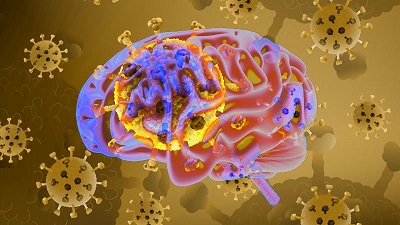University Of California Study Involving Rhesus Macaques Finds That SARS-CoV-2 Virus Infects The Neurons Of The Brain And Induces Neuroinflammation
Source: Medical News - SARS-CoV-2 - Brain Oct 14, 2022 2 years, 6 months, 1 week, 5 days, 11 hours, 5 minutes ago
A new study by researchers from the University of California-Davis, USA involving animal models such as the Rhesus Macaques has found that SARS-CoV-2 coronavirus is able to infect the neurons of the brain and induce inflammation.

SARS-CoV-2 coronavirus, the etiologic agent of coronavirus disease 2019 (COVID-19), can induce a plethora of neurological complications in some patients.
To date however, it is still under debate if SARS-CoV-2 directly infects the brain or if CNS sequelae result from systemic inflammatory responses triggered in the periphery.
The study team utilizing high-resolution microscopy, investigated whether SARS-CoV-2 reaches the brain and how viral neurotropism can be modulated by aging in a non-human primate model of COVID-19.
The study findings showed that seven days after infection, SARS-CoV-2 was detected in the olfactory cortex and interconnected regions, accompanied by robust neuroinflammation and neuronal damage exacerbated in aged diabetic animals.
The study findings provide an initial framework for identifying the molecular and cellular mechanisms underlying SARS-CoV-2 neurological complications, which will be essential to reducing both the short- and long-term burden of COVID-19.
The study findings were published in the peer reviewed journal: Cell Reports as journal pre-proof.
https://www.cell.com/cell-reports/pdf/S2211-1247(22)01434-6.pdf
The study findings alarmingly showed that SARS-CoV-2 causes significant neuron damage and inflammation within a week of infection in rhesus macaque monkeys.
The study from the California National Primate Research Center at the University of California, Davis, also discovered that aged monkeys with type 2 diabetes experienced worse virus-induced neurological damage.
The study findings provide an important framework to study the long-term neurological symptoms linked to COVID-19.
Recent studies have shown that up to eighty percent of hospitalized individuals testing positive for COVID-19 reported neurological symptom.
https://pubmed.ncbi.nlm.nih.gov/33974053/
https://pubmed.ncbi.nlm.nih.gov/34189535/
Unfortunately, studies in humans have been unable to confirm whether these symptoms are due to a general inflammatory response in the body, or if the virus directly infects the brain.
Thailand
Medical News had previously covered numerous other studies on how the SARS-CoV-2 virus infects and affects the brain.
https://www.thailandmedical.news/news/breaking-brazil-study-provides-evidence-that-sars-cov-2-infects-the-astrocytes-of-the-human-brain-using-nrp1-receptors-and-causes-damage
ilandmedical.news/news/u-s-nih-s-and-u-s-army-s-neurocovid-study-shows-that-sars-cov-2-infections-causes-serious-damage-to-microvessels-in-the-brain">https://www.thailandmedical.news/news/u-s-nih-s-and-u-s-army-s-neurocovid-study-shows-that-sars-cov-2-infections-causes-serious-damage-to-microvessels-in-the-brain
https://www.thailandmedical.news/news/breaking-u-s-study-shows-that-even-mild-sars-cov-2-infections-lead-to-brain-inflammation,-brain-damage-and-also-cognitive-issues
https://www.thailandmedical.news/news/another-study-findings-adds-to-the-increasing-evidence-that-sars-cov-2-infection-increases-risk-of-brain-degeneration-that-will-lead-to-parkinson-s-di
https://www.thailandmedical.news/news/breaking-study-alarmingly-reveals-that-sars-cov-2-infections-causes-widespread-prevalence-of-inflammatory-microvasculopathy-in-brains-of-infected
https://www.thailandmedical.news/news/new-non-human-primate-study-alarmingly-reveals-that-sars-cov-2-infections-can-lead-to-brain-inflammation,-brain-hypoxia,-brain-bleeding-and-also-strok
https://www.thailandmedical.news/news/great-news-university-of-oxford-study-shows-that-even-mild-sars-cov-2-infections-can-result-in-brain-changes-and-cognitive-decline
https://www.thailandmedical.news/news/swiss-study-shockingly-reveals-that-sars-cov-2-triggered-inflammation-leads-to-increased-neurotoxic-damage-in-cortical-areas-of-the-human-brain
https://www.thailandmedical.news/news/great-news-south-korean-study-shows-that-sars-cov-2-is-literally-killing-the-microglia-cells-in-the-host-brain-hence-the-various-arising-neurological-
https://www.thailandmedical.news/news/more-great-news-stanford-yale-study-shows-even-mild-sars-cov-2-infection-can-cause-multi-lineage-cellular-dysregulation-and-myelin-loss-in-the-brain
https://www.thailandmedical.news/news/breaking-german-scientists-discover-that-sars-cov-2-main-protease-mpro-causes-microvascular-brain-pathology
https://www.thailandmedical.news/news/saudi-arabia-mri-study-provide-further-evidence-that-sars-cov-2-affects-the-brain-with-57-9-percent-of-severe-covid-19-patients-having-brain-lesions
https://www.thailandmedical.news/news/study-confirms-that-even-in-asymptomatic-to-mild-cases-of-infections,-sars-cov-2-leaves-a-mark-on-the-brain
https://www.thailandmedical.news/news/breaking-sars-cov-2-spike-proteins-bind-to-brain-s-mao-enzymes-causing-neurological-issues-binding-affinity-is-enhanced-in-some-emerging-variants
https://www.thailandmedical.news/news/breaking-researchers-puzzled-as-new-study-shows-that-covid-19-patients-manifest-reduced-volume-of-brain-gray-matter
https://www.thailandmedical.news/news/university-of-pennsylvania-mri-study-of-the-brain-alarmingly-shows-that-many-covid-19-patients-exhibit-leukoencephalopathy
https://www.thailandmedical.news/news/a-first-in-medical-history-john-hopkins-study-finds-that-sars-cov-2-causes-megakaryocyte-cells-to-be-found-in-brain-cells-resulting-in-covid-brain-fog
https://www.thailandmedical.news/news/covid-19-research-university-of-california-led-study-finds-that-brain-pericytes-could-be-entry-points-for-sars-cov-2-and-are-potential-reservoirs
https://www.thailandmedical.news/news/coronavirus-news-u-s-nih-autopsy-studies-shows-severe-brain-damage-in-covid-19-patients
https://www.thailandmedical.news/news/viral-persistence-georgia-state-university-study-indicates-that-sars-cov-2-may-hide-in-the-brain-and-cause-relapses-in-recovered-patients
https://www.thailandmedical.news/news/new-covid-19-research-indicates-that-sars-cov-2-can-penetrate-the-blood-brain-barrier
https://www.thailandmedical.news/news/covid-19-news-american-study-confirms-that-spike-proteins-of-sars-cov-2-coronavirus-is-able-to-disrupt-the-human-blood-brain-barrier
https://www.thailandmedical.news/news/covid-19-news-review-of-eeg-screenings-of-covid-19-patients-reveals-varying-degrees-of-brain-damage
https://www.thailandmedical.news/news/breaking-swiss-and-canadian-scientists-discover-that-sars-cov-2-uses-host-cathepsins-to-bind-and-gain-entry-into-the-brain-and-its-vasculature
https://www.thailandmedical.news/news/covid-19-german-autopsy-study-of-43-deceased-covid-19-patients-reveals-shocking-findings-of-how-sars-cov-2-virus-directly-damages-the-brains
https://www.thailandmedical.news/news/covid-19-news-latest-study-confirms-that-sars-cov-2-is-able-to-infect-the-brain-and-cause-neurological-issues
https://www.thailandmedical.news/news/covid-19-neurology-john-hopkins-shows-how-the-sars-cov-2-coronavirus-infects-brain-cells-in-organoid-study
https://www.thailandmedical.news/news/breaking-brain-injury-swedish-researchers-warn-that-signs-of-brain-injury-displayed-in-both-severe-and-moderate-covid-19-patients
https://www.thailandmedical.news/news/breaking-french-covid-19-research-reveals-that-the-hypothalamus-region-of-the-brain-is-also-a-target-for-the-sars-cov-2-coronavirus
https://www.thailandmedical.news/news/covid-19-research-new-study-reveals-impact-of-covid-19-on-the-brain
https://www.thailandmedical.news/news/breaking-alert-covid-19-italian-researchers-discover-brain-lesions-on-covid-19-patients
https://www.thailandmedical.news/news/breaking-news-covid-19-latest-shocking-discovery-that-many-covid-19-patients-in-icu-have-abnormalities-detected-on-brain-mri-scans
In the current study, utilizing a recently developed nonhuman primate model of the disease, the study team revealed that COVID reaches the brain by transport through the nose along the olfactory nerve, a nerve that starts in the brain and ends in the upper inside part of the nose.
Senior author Dr John Morrison, professor of neurology at UC Davis and director of the CNPRC said, "We not only demonstrated that the virus infects the brain, but also that it directly infects neurons and can be transported along nerve pathways to sites beyond the initial olfactory regions."
In the study, both young, healthy rhesus macaques and aged animals with type 2 diabetes were inoculated with the SARS-CoV-2 virus and compared to noninfected, age-matched controls. Seven days after the animals were exposed to the virus, researchers were able to identify the virus in brain tissue as well as several different types of brain cell. High-powered microscopes allowed the scientists to visualize interactions between the virus and brain cells.
The study findings leave no doubt that the virus was entering the brain and damaging brain cells along the way, said first author Dr Danielle Beckman, a postdoctoral researcher at UC Davis. By comparing young and aged animals, it became clear that viral infection was exacerbated in the aged animals. Brain cells of infected aged monkeys appeared shrunken.
The study team said that most striking was the distance the virus traveled in aged animals compared to the young, healthy animals. While the virus was mostly found in the primary olfactory cortex in all inoculated animals, the virus spread further in aged animals. Cellular markers of SARS-CoV-2 were seen in regions of the brain extending beyond immediate sensation and perception of smell, and into areas highly involved in emotion, memory and cognition in aged animals.
The study findings raise concerns about potential spikes in neurodegenerative diseases and vulnerability to dementia-related illnesses, like Alzheimer's, as infected adults age.
Dr Morrison added, "In the aged monkeys in particular, the virus is infecting neurons in regions known to be highly vulnerable to Alzheimer's disease.”
The study team also aimed to understand how the virus could cause cell damage and lasting impacts on the brain. Evidence suggests that SARS-CoV-2 causes inflammation in the brain. Cells in the central nervous system respond by breaking down and removing the inflamed cells.
Dr Beckman said, "Although this process can be beneficial and is meant to heal the central nervous system, the intensity with which SARS-CoV-2 induced inflammation in aged rhesus macaques led to significant damage."
Further identifying the molecular and cellular mechanisms causing long-term symptoms of infection will be essential to reduce the burden of COVID-19 neurological complications. The current study findings lay the groundwork for future studies and highlight the critical role of nonhuman primate models in this research.
The study team are now studying the brains from monkeys several months after infection to better understand the extent and nature of brain damage that might underlie the long-term neurological complications of COVID-19.
For more about SARS-CoV-2 and its effects on the host brain, keep on logging to Thailand
Medical News.
Read Also:
https://www.thailandmedical.news/news/breaking-u-s-nih-study-shockingly-reveals-sars-cov-2-viral-persistence-throughout-human-body-and-in-the-brain-even-in-those-who-were-asymptomatic
https://www.thailandmedical.news/news/study-of-over-1-2-million-post-covid-19-individuals-shows-that-neurological-and-psychiatric-issues-still-manifest-in-many-even-after-two-years
https://www.thailandmedical.news/news/washington-university-study-shows-sars-cov-2-infections-increases-risk-of-various-neurological-issues-including-strokes-cognitive-disorders-and-enceph
https://www.thailandmedical.news/news/netherlands-study-shockingly-reveals-that-individuals-with-long-covid-typically-suffer-massive-brain-neuroinflammation-including-in-the-thalamus-regio
https://www.thailandmedical.news/news/icahn-study-shows-that-cognitive-decline-and-brain-fog-can-persist-up-to-8-months-after-contracting-covid-19-and-the-scale-is-astounding
https://www.thailandmedical.news/news/alarmingly-many-non-hospitalized-covid-19-patients-will-exhibit-brain-fog-for-weeks-or-months-after-infection-according-to-university-of-oxford-study
https://www.thailandmedical.news/news/study-indicates-that-even-those-with-mild-or-asymptomatic-covid-19-can-develop-brain-inflammation-and-other-neurological-conditions-in-long-term
https://www.thailandmedical.news/news/neurocovid-study-shows-that-covid-19-brain-fog-caused-by-inflammatory-molecules-in-the-cerebral-spinal-fluid
https://www.thailandmedical.news/news/covid-19-symptoms-smell-loss-most-likely-due-to-brain-metabolic-changes-and-not-sars-cov-2-neuro-invasiveness-according-to-belgium-study
https://www.thailandmedical.news/news/neuro-covid-university-of-michigan-academic-warns-of-potential-memory-loss-and-dementia-in-covid-19-patients
https://www.thailandmedical.news/news/covid-19-delirium-researchers-from-trinity-college-discover-that-delirium-in-most-covid-19-patients-linked-to-altered-glucose-metabolism-in-brain
https://www.thailandmedical.news/news/breaking-covid-19-neurology-study-says-more-neurological-complications-arising-in-covid-19-including-adem-acute-disseminated-encephalomyelitis
https://www.thailandmedical.news/news/covid-19-neurology-german-study-shows-that-autoantibodies-from-the-cerebrospinal-fluid-targets-the-brain-in-certain-covid-19-patients
https://www.thailandmedical.news/news/covid-19-case-study-utilizing-functional-mri-on-unresponsive-covid-19-patients-offers-hope-for-recovery
https://www.thailandmedical.news/news/neurologists-in-a-collaborative-study-identify-stages-of-brain-damage-caused-by-covid-19-and-warns-of-future-issues-in-recovered-patients
https://www.thailandmedical.news/news/covid-19-treatments-addressing-brain-neuro-inflammation-critical-to-improving-breathing-following-lung-injury-in-covid-19-patients
